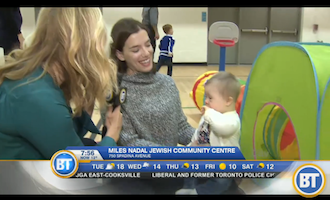
In Toronto, ‘inclusion’ is for everyone
By Liviya Mendelsohn
 Liviya Mendelsohn is Accessibility and Inclusion Manager for the Miles Nadal Jewish Community Center (MNjcc) and Inclusion Specialist for UJA Federation of Toronto. She an M.A. in the history of Public Health and an M.Ed. in Counselling Psychology, and is completing a post-graduate certificate in Disability Studies. At the Miles Nadal JCC in downtown Toronto, Liviya is facilitating an ongoing initiative to assess and improve the accessibility of MNjcc facilities, programs and services. The JCC has been recognized by the Ontario Non-Profit Network as a provincial accessibility best practice case study organization.
Liviya Mendelsohn is Accessibility and Inclusion Manager for the Miles Nadal Jewish Community Center (MNjcc) and Inclusion Specialist for UJA Federation of Toronto. She an M.A. in the history of Public Health and an M.Ed. in Counselling Psychology, and is completing a post-graduate certificate in Disability Studies. At the Miles Nadal JCC in downtown Toronto, Liviya is facilitating an ongoing initiative to assess and improve the accessibility of MNjcc facilities, programs and services. The JCC has been recognized by the Ontario Non-Profit Network as a provincial accessibility best practice case study organization.
When you enter the Miles Nadal JCC, you will notice a framed document which begins: “Diversity and social inclusion are at the heart of what we do at the Miles Nadal JCC.” Accessibility and inclusion are not only guiding principles, core values, but also we what do—what we practice every day from interactions at the information desk, to inclusive program design, to an accessible website.
- “I want to be fully accepted, with no conditions.”
- “I want to be able to dance with my friends and not placed in a group based on my disability.”
- “I want to be able to bring my whole family to a Chanukah party and not worry about people judging my daughter with Autism.”
 According to one staff member: “I remember the first day of Accessible Yoga. I’ve worked in this building for over 18 years and I was expecting a ‘normal busy’ Sunday. The participants started to arrive, and I didn’t recognize anyone! That’s when it struck me that inclusive programming means reaching so many more people than we were before. Of course I hadn’t seen them before—they didn’t think of us as a place that could serve them. That day cemented my commitment to changing that notion!”
According to one staff member: “I remember the first day of Accessible Yoga. I’ve worked in this building for over 18 years and I was expecting a ‘normal busy’ Sunday. The participants started to arrive, and I didn’t recognize anyone! That’s when it struck me that inclusive programming means reaching so many more people than we were before. Of course I hadn’t seen them before—they didn’t think of us as a place that could serve them. That day cemented my commitment to changing that notion!”
We discovered that the changes we were making were of benefit to everyone. A sensory-friendly bean-bag chair-filled quiet room added to our Chanukah carnival made sensory breaks possible for kids with Autism, but also provides a quiet nursing space, and a resting spot for anyone who is overwhelmed by all the activity. An all-ages, all-bodies dance party provides an accessible, comfortable and safe space for everyone—bubbies and babies, kids with behavioural differences, trans members of our community—all dance together with great and spontaneous joy.
Everyone has something to learn, and everyone has something to teach. A swimmer who accesses our in-pool swim guide program (where volunteers swim and splash in front of blind swimmers, orienting them so they can swim independently) has shared her skills with us in our nursery and pre-school, teaching kids about storytelling, drama, and life as an artist who is blind.
 We’ve decided not to create separate ‘special needs’ programs – we create accessible environments where everyone can enjoy recreation, wellness and Jewish life together. We are an interdependent community, and when we welcome everyone in we learn from each other and learn to respect difference, to give each other kavod [honor].
We’ve decided not to create separate ‘special needs’ programs – we create accessible environments where everyone can enjoy recreation, wellness and Jewish life together. We are an interdependent community, and when we welcome everyone in we learn from each other and learn to respect difference, to give each other kavod [honor].
This is an ongoing journey, and we have lots of work to do together. At the Miles Nadal JCC, inclusion is our present and our future.
About the author
Stay Included
To stay up to date on our most recent advocacy efforts, events and exciting developments, subscribe to our newsletter and blog!



















